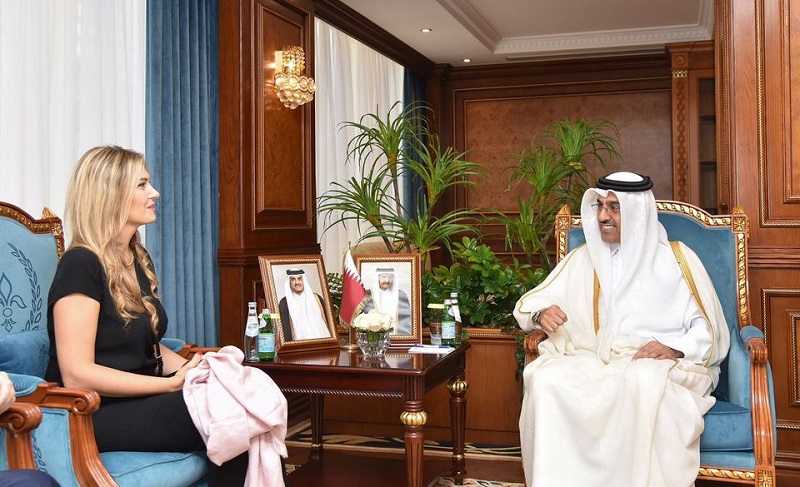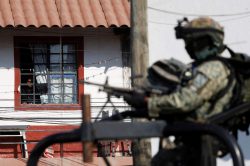
Ali bin Samikh Al Marri, Qatar’s minister of labour, speaks with Greece’s Eva Kaili, vice president of the European Parliament, during a meeting in Qatar, October 31, 2022 in this social media handout image.
12:20 JST, December 13, 2022
BRUSSELS (Reuters) – The European Parliament moved on Monday to strip one of its members of her role as vice president after she and others faced criminal charges over allegations Qatar lavished them with cash and gifts to influence decision-making.
Greece on Monday froze the assets of a key suspect in the case, Eva Kaili, one of 14 vice presidents of the parliament and among four people arrested and charged in Belgium at the weekend, a source with knowledge of the matter said.
Kaili’s office did not respond to a request for a comment. Qatar has denied any wrongdoing.
Belgian prosecutors searched 19 homes and the offices of the parliament from Friday to Monday, seizing computers, mobile phones and several hundred thousands of euros at the home of one suspect, in a flat belonging to an EU lawmaker and in a suitcase in a Brussels hotel room.
The four unnamed suspects have been charged with “participation in a criminal organization, money laundering and corruption,” prosecutors said.
The scandal is particularly awkward for the parliament, which has seen itself as a moral compass in Brussels, issuing resolutions critical of human rights abuses across the globe and taking EU governments to task. Germany said it jeopardized the credibility of Europe.
Some European diplomats had told Reuters last month that pressure to maintain good ties with Qatar was increasing as the continent headed towards a winter of energy shortages because of the Russian invasion of Ukraine.
The European Parliament suspended Kaili from her duties on Saturday. On Monday, as EU lawmakers convened in Strasbourg, the chamber’s president Roberta Metsola said she was launching a procedure to end her role as vice president.
The Greek socialist PASOK party is expelling her from its ranks.
Belgian prosecutors said they had suspected for more than four months that a Gulf state was trying to buy influence in Brussels.
A source with knowledge of the case said the state was Qatar. A Qatari official denied at the weekend accusations of possible misconduct.
The European Parliament had been due to vote this week on a proposal to extend visa-free travel to the EU for Kuwait, Qatar, Oman and Ecuador, but this has now been shelved.
The investigation comes as World Cup host Qatar is in the global spotlight, amid criticism of its human rights record, including its treatment of migrant workers.
In a speech in the European Parliament on Nov. 21, at the start of the month-long soccer tournament, Kaili lashed out at Qatar’s detractors and hailed the energy-rich Gulf State as “a frontrunner in labor rights.”
CREDIT CARD
According to a source familiar with the case, the other accused are Italian citizens — former EU lawmaker Pier Antonio Panzeri, Kaili’s partner Francesco Giorgi, who is a parliamentary assistant, and Niccolo Figa-Talamanca, secretary-general of a human rights campaign group.
Another Italian, general secretary of the International Trade Union Confederation Luca Visentini, was released under conditions, meaning he is still under suspicion, the source said.
There were no replies to calls and emails made by Reuters to their respective offices or homes in Belgium.
Belgium also submitted European arrest warrants for Panzeri’s wife and daughter in Italy, according to extracts seen by Reuters.
It said Panzeri was suspected of receiving payments from Qatar and Morocco to influence people working at the European Parliament and that his wife Maria Colleoni and adult daughter Silvia were aware of the activities.
It says they took part in the transport of gifts and Panzeri and his wife had use of a credit card of a third person they called the “geant” (giant). The person was not identified.
Nicola Colli, a lawyer of the Panzeri family, said the wife and daughter were under house arrest and a court would decide next week whether to hand them over to Belgian authorities.
There was no immediate reaction to a request for comment from the Moroccan government.
German foreign minister Annalena Baerbock, meeting EU counterparts in Brussels, called the incident “unbelievable.”
“This is about the credibility of Europe,” she told reporters.
European Commission president Ursula von der Leyen described the allegations as of “utmost concern” and highlighted a Commission proposal for the creation of an independent ethics body for all EU institutions.
“It is a question of confidence of the people in our institutions,” she said.
Top Articles in News Services
-

Survey Shows False Election Info Perceived as True
-

Hong Kong Ex-Publisher Jimmy Lai’s Sentence Raises International Outcry as China Defends It
-

Japan’s Nikkei Stock Average Touches 58,000 as Yen, Jgbs Rally on Election Fallout (UPDATE 1)
-

Japan’s Nikkei Stock Average Falls as US-Iran Tensions Unsettle Investors (UPDATE 1)
-

Trump Names Former Federal Reserve Governor Warsh as the Next Fed Chair, Replacing Powell
JN ACCESS RANKING
-

Producer Behind Pop Group XG Arrested for Cocaine Possession
-

Japan PM Takaichi’s Cabinet Resigns en Masse
-

Man Infected with Measles Reportedly Dined at Restaurant in Tokyo Station
-

Israeli Ambassador to Japan Speaks about Japan’s Role in the Reconstruction of Gaza
-

Videos Plagiarized, Reposted with False Subtitles Claiming ‘Ryukyu Belongs to China’; Anti-China False Information Also Posted in Japan























